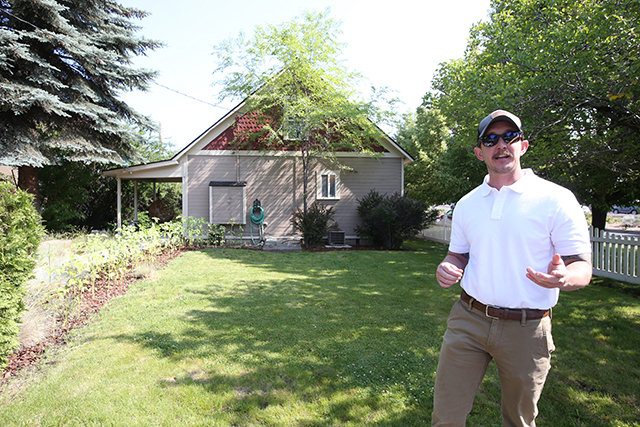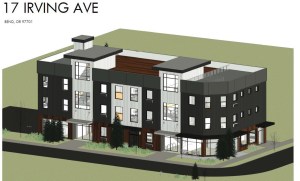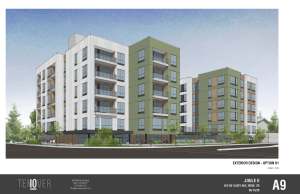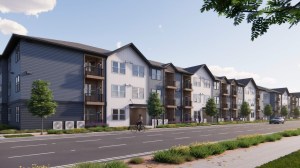Bend tax rebates for housing near $100 million
Published 11:00 pm Monday, June 23, 2025

- Jonathan Taylor, Bend urban renewal manager, shows property the city of Bend approved tax rebates for the developer who is building multifamily housing, on Irving Ave, in Bend Monday morning. 6-23-25 Andy Tullis/The Bulletin
Over the next several decades, the city of Bend is set to make a $96 million investment in multifamily housing.
The city has promised a rebate on property taxes for a handful of developers if they can build apartments with a certain level of affordability in the next few years.
Even with that promise, it’s no guarantee those projects will come to fruition.
Trending
“We don’t know. No one knows,” said Jonathan Taylor, the city of Bend’s urban renewal manager, who created the new tax increment financing program to bring down the cost of rent across the city.
But based on interest from developers, that program has been an early success. It’s teed up eight projects and 1,300 units — including 266 where rents will be restricted to people earning somewhere below the area median income — and helped chart the course for large multifamily development near the city’s core area, where unfavorable market conditions like high costs and interest rates have stymied projects for months.
“It takes a lot of effort to get projects moving when the market conditions are where they are now — Bend is doing its best to put a hand on the scale — and this is the type of creativity it will take to counteract the challenging market conditions,” said Lynne McConnell, the city’s former housing director who now leads Housing Works, the regional housing authority.
Tax increment financing, or urban renewal, is a funding tool allowing local governments to freeze property tax levels at a base rate and capture taxes collected on new development for reinvestment in an area. Typically, urban renewal districts span hundreds of acres. But under the city’s new program, the districts are single property parcels where a developer wants to build housing. Property taxes collected by the tiny tax increment financing district will be reinvested by paying developers to help finance the housing.
“The climate right now for development is… I mean brutal is probably not an exaggeration,” Peter Grube, of Bend-based multifamily builder Roost Development, told the city council at a meeting June 18. Roost is partnering with Astral Development, headquartered in New York City, and a nonprofit owner to build a six-story, 125-unit apartment building on the corner of Olney Street and Fourth Street in midtown Bend.
After approving a second round of tax rebates, the Bend City Council paused the new program at a June 18 meeting to evaluate its effectiveness. A pause to assess was part of the plan when the program was created last year.

Three more multifamily housing projects were approved for property tax rebates through the city’s new tax increment financing program to encourage lower-cost housing development. (City of Bend)
Trending
Later in Wednesday’s meeting, the city launched a new committee to spearhead other tools to help the city meet aggressive housing goals.
A state analysis projects Bend will need about 33,000 units in the next 20 years to meet supply needs. That means the city will need to produce about 1,400 new residential units per year — 300 more than the yearly average since 2014. And the city needs to produce more than 1,000 multifamily units by 2028 to meet goals set by the state in 2016.
Average market rate rent in Bend is hovering around $1,800, with about half of renters burdened — spending more than 30% of income — by that cost.
The tax rebate program replaced the city’s former developer incentive program, the Multiple Unit Property Tax Exemption program, which was scrapped in 2024 following pushback to an exemption awarded to a controversial apartment building near the Box Factory in Bend’s core area. The city has not received the same level of consternation at public meetings over the new program, which is different because it requires rents to be restricted at or below 90% of the area median income for at least 15% of the units in any given project.
Even if the project meets all of the program’s requirements, the Bend City Council, acting as the Bend Urban Renewal Agency, has full discretion to deny the tax rebate.
That hasn’t happened so far, although some city councilors have expressed reservations about some projects and the rebate program as a whole.
Developments of all sizes in almost every area of the city have been able to qualify.
The city gave swift approval for a three-story, 24-unit studio apartment building adjacent to the Bend Parkway near downtown on Irving Street. Eric Krecu, an independent developer who lives in Redmond, said the project “probably wouldn’t get off the ground” without the tax rebate. Half of the units will be restricted to people earning 80%-90% of the area median income.

A rendering shows what the 24-unit PKWY Studios apartments will look like on Irving Street near the Bend Parkway. The project has approval for a $5.4 million tax rebate from the city of Bend because it provides a certain level of units restricted based on income. (City of Bend)
City councilors were more skeptical about other projects. One was the Joule apartments, the six-story building on Fourth and Olney. The development promises 48 units at 60% to 90% area median income, the only project in the program so far to reach that level of affordability. Offering dense housing plus walkability and bikeability, the development could be “a landmark for what’s to come” in the city’s core area, said David Mosey, of Astral Development, a partner on the project.
The city council tentatively approved the tax rebate for the project, with plans to reassess later this year. Concerns included uncertainty over financing and land use and permit approval.

A schematic design shows what the Joule apartments could look like. (David Mosey / Astral Development)
But if everything goes to plan, the project will break ground next year, Mosey said.
Councilors also expressed some concerns over a 264-unit apartment project on 8 acres in southeast Bend south of Ferguson Road. If those units are built, the city will pay back $21.4 million over the next 24 years. One-fifth of the units will be income restricted. The units could be open to renters by next year.
The property has changed hands multiple times since it was brought into the city’s urban growth boundary in 2016 as part of a larger expansion. Out of more than 2,000 acres brought into the city during that expansion, these acres and the surrounding lands have been some of the slowest to develop.

A rendering shows what the housing project Emblem will look like in southeast Bend off of Ferguson Road. The 264-units project, which includes 53-income restricted units, got approval for a $21 million rebate from the city of Bend. (City of Bend)
A lack of productivity is one of the characteristics of “blighted” land eligible for urban renewal, according to the state’s definition. What qualifies as blighted is one of the most debated topics of urban renewal in Oregon, said Taylor, the city’s urban renewal manager. For the city of Bend, the definition has been adaptable. It applies not only to land where previous uses have faded away and now need revitalization, like the city’s Core Area urban renewal district encompassing the center of town, but also untouched residential areas that haven’t been developed due to market conditions or other factors.
The city conducts a robust analysis for each property to make sure it qualifies for urban renewal, Taylor said.
Councilor Ariel Méndez said that while the lands might meet the legal definition of blight, they had been added into the urban growth boundary relatively recently.
“It seems like we’re using a very special tool for what should pop on its own,” he said last week.
He voted against awarding a tax rebate for the project, along with Councilor Gina Franzosa.
“I’m concerned it’s being used on relatively high value land in areas that are under development as opposed to within the Core Area,” Franzosa said in an interview.
Councilor Steve Platt voted in favor of the rebate, but said he wrestled with the potential transportation problems associated with development at the edge of the city.
But Bend Mayor Melanie Kebler said the city has been desperately trying to spur development in the southeast area, which is slated to deliver much of the city’s needed housing.









